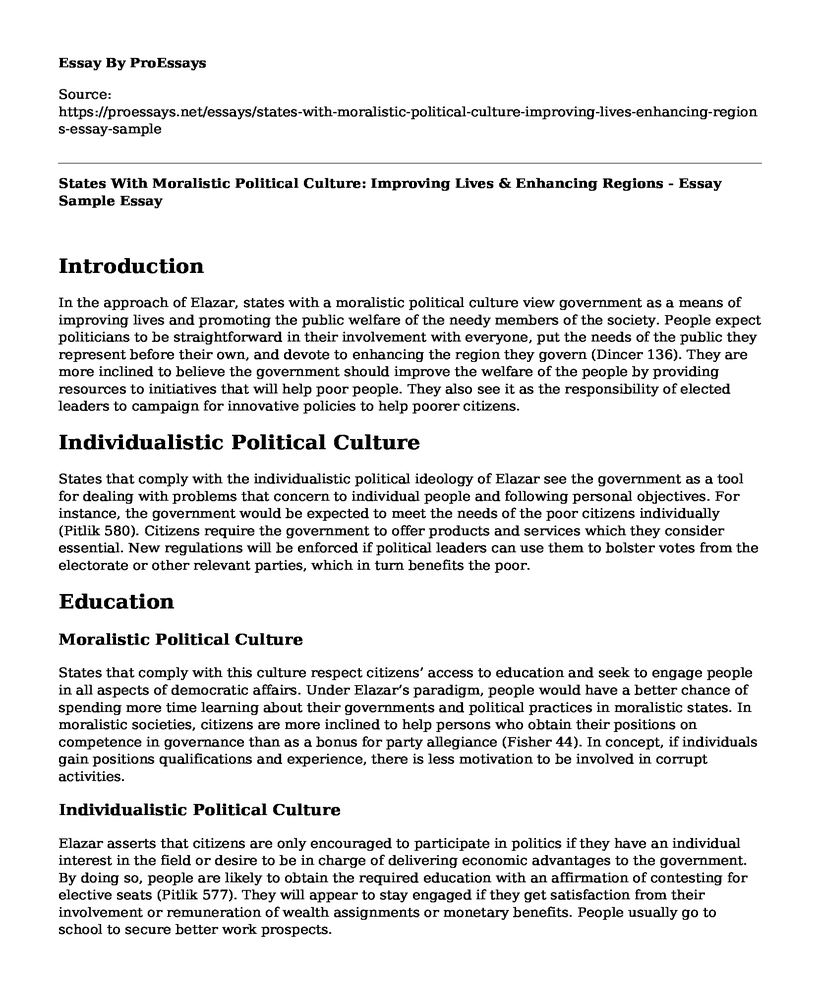Introduction
In the approach of Elazar, states with a moralistic political culture view government as a means of improving lives and promoting the public welfare of the needy members of the society. People expect politicians to be straightforward in their involvement with everyone, put the needs of the public they represent before their own, and devote to enhancing the region they govern (Dincer 136). They are more inclined to believe the government should improve the welfare of the people by providing resources to initiatives that will help poor people. They also see it as the responsibility of elected leaders to campaign for innovative policies to help poorer citizens.
Individualistic Political Culture
States that comply with the individualistic political ideology of Elazar see the government as a tool for dealing with problems that concern to individual people and following personal objectives. For instance, the government would be expected to meet the needs of the poor citizens individually (Pitlik 580). Citizens require the government to offer products and services which they consider essential. New regulations will be enforced if political leaders can use them to bolster votes from the electorate or other relevant parties, which in turn benefits the poor.
Education
Moralistic Political Culture
States that comply with this culture respect citizens’ access to education and seek to engage people in all aspects of democratic affairs. Under Elazar’s paradigm, people would have a better chance of spending more time learning about their governments and political practices in moralistic states. In moralistic societies, citizens are more inclined to help persons who obtain their positions on competence in governance than as a bonus for party allegiance (Fisher 44). In concept, if individuals gain positions qualifications and experience, there is less motivation to be involved in corrupt activities.
Individualistic Political Culture
Elazar asserts that citizens are only encouraged to participate in politics if they have an individual interest in the field or desire to be in charge of delivering economic advantages to the government. By doing so, people are likely to obtain the required education with an affirmation of contesting for elective seats (Pitlik 577). They will appear to stay engaged if they get satisfaction from their involvement or remuneration of wealth assignments or monetary benefits. People usually go to school to secure better work prospects.
Works Cited
Dincer, Oguzhan, and Michael Johnston. "Political culture and corruption issues in state politics: A new measure of corruption issues and a test of relationships to political culture." Publius: The Journal of Federalism 47.1 (2017): 131-148.
Fisher, Patrick. "The Political Culture Gap: Daniel Elazar's Subculture in Contemporary American Politics." Journal of Political Science 44 (2016).
Pitlik, Hans, and Martin Rode. "Individualistic values, institutional trust, and interventionist attitudes." Journal of Institutional Economics 13.3 (2017): 575-598.
Cite this page
States With Moralistic Political Culture: Improving Lives & Enhancing Regions - Essay Sample. (2023, Aug 27). Retrieved from https://proessays.net/essays/states-with-moralistic-political-culture-improving-lives-enhancing-regions-essay-sample
If you are the original author of this essay and no longer wish to have it published on the ProEssays website, please click below to request its removal:
- Essay on Ethical Issues and Challenges They Pose
- Views of Aristotle and Nietzsche About Good Life Essay
- Essay Example on Plato's Views on Education: An Insight Into Ancient Athens
- Essay Sample on Tech Shaping Politics: Impact of Social Media on Elections
- Essay on Stanley Milgram: Unravelling the Dark Side of Human Nature
- Essay Example on Gov't Bailout of Troubled Companies: Pros, Cons, & Big Q's
- Free Essay Example on Lifestyle Choices: Impact on Health & Happiness







